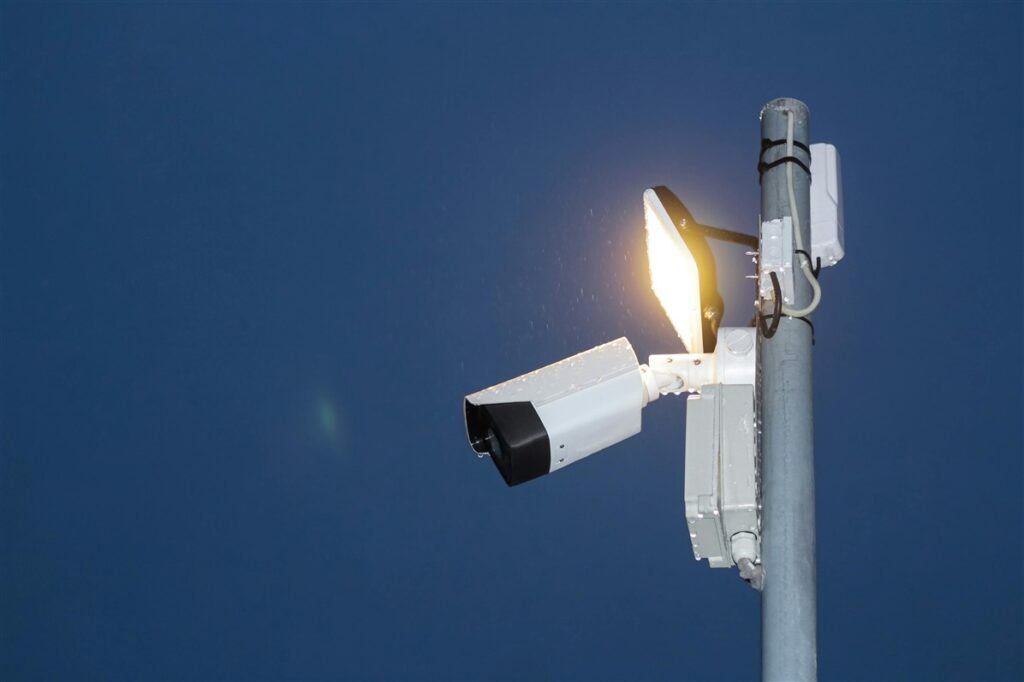Get the facts – Using electricity outside
Flashing fairy lights, nodding Rudolphs and dancing Santas – a favourite local news story at this time of year is the over-the-top neighbour who has filled their garden and covered their house with Christmas lights and decorations. If you’re unlucky you might live next door to one – or perhaps you’re one yourself...
While some of the principles remain the same, when it comes to commercial and industrial premises using electricity outside is best left to the professionals.
Worth the risk?
The first thing that any professional electrical company will do when planning outdoor work is to carry out a risk assessment. This should identify any potential hazards before the work begins and ensure that those involved with the work are aware of these risks, creating a safer working environment.
Because electrical contractors are used to working outside, they will have a good understanding of the potential risks and how to mitigate them. They should also have the correct equipment for the job at hand; in some cases battery-operated hand tools or air tools might be a better option than running cables for tools that need plugging in.
Electrical contractors are legally responsible to follow the Electricity at Work Regulations (The Health and Safety at Work Act 1974). This includes restrictions on working on or near live circuits. As with indoor work, any completed work should be fully inspected and tested before being put into use (see Lee’s Soapbox for more on this matter).
Stormy weather
Keeping water away from an electric current tends to be more difficult outdoors – especially with the British weather. Wet weather can also make surfaces slippery, which can be a danger for contractors, particularly if they are working at height, and strong winds can also pose a risk.
Potential weather hazards include:
- Electric shock from water getting into electrical equipment.
- Slipping on wet ground.
- Falling from a slippery roof when working at height.
- Falling from a ladder in high winds.
- Equipment (ladders etc) falling on people working nearby.
- Being hit by falling branches or other miscellaneous items while using a power tool.
Unusually hot weather – it does occasionally happen in this country – can also present a risk, as direct sunlight can damage equipment or even spark a fire.
Light up
Most companies will have permanent lighting installed on the outside of their building and at the entrance to their site.
As this has to be weatherproof, it’s best to take advice from a professional electrical engineer on the best kind of lighting for each individual location. A straightforward exterior light over a door, for example, would not be the same rating as a light intended for a water feature.
They will also be able to advise on energy- saving options: for example, motion sensor lights that only come on when someone approaches or leaves the building.
Don’t take a trip
Working outdoors often requires cables to be run from indoor power sources. As this work is regularly carried out during working hours, make sure that your electrical contractors follow the correct health and safety procedures. This will not only protect their team but it will ensure that your own employees don’t run the risk of tripping on wires or coming into contact with other safety hazards.
Cabling is of course also needed to provide the energy to run the outdoor light or other electric fitting.
In both cases, a good electrical contractor will use weather-resistant cables suitable for outdoor use and will check that they are in a good, usable state: ie clean and undamaged. They will also position cables to prevent damage and keep them as dry as possible.
Switch off for safety
An RCD or Residual Current Device monitors an electrical current and automatically switches it off if there’s a fault, for example if a cable is accidentally cut through. They are useful when working outside, as they reduce the risk of electrical fires and offer protection from electric shock. In a domestic situation, an RCD should be fitted to any socket used for plugging in a lawnmower or garden power tools.
Because of the additional risks attached to working outside, you should always hire an electrical contractor with experience of this kind of work – and trust their judgement on delaying work when weather conditions make it hazardous to continue.
If you are planning any outside work to your business premises or grounds, contact us on 01924 283 737, and we’ll be happy to advise you on the best approach.

Our guide to building energy management systems
Building energy management systems (BEMS) are systems that allow you to monitor, control, and optimise the energy used within your building. The phrase building energy management system (BEMS) is often used interchangeably with the phrase building management system (BMS), but there are some differences. A BEMS is focused on energy-related systems such as lighting, heating, […]
Read more
How far does power travel and what impact does distance have on performance
It’s easy to take our electricity supply for granted. We flick a switch and instantly have light or power. We don’t even think about it unless there’s an issue or an outage. But when there is an issue or outage, the impact can be significant. For manufacturers, even the smallest change in power can make […]
Read more
Why visibility of the production process is so important
Operational excellence, efficiency and quality are top priorities for almost every manufacturer worldwide. These things lead to improved productivity, happier customers and reduced waste – all of which result in increased profits. Visibility of the production process is the key to achieving these things. And manufacturers now have access to technology that can provide real-time […]
Read more
Will security lighting help to protect my staff?
Looking after the safety and well-being of employees should be a priority for any business. And while it’s not possible to mitigate every risk, there are measures you can take to improve their safety and security. One measure that is often overlooked is the installation of security lighting. When daylight disappears, visibility is reduced, increasing […]
Read more
Top 5 considerations when comparing electrical quotes
Budget is always a factor when you’re considering any type of upgrade, revamp, or maintenance work within your factory. But when it comes to electrical work, you have to consider more than just money. Don’t rush into accepting the cheapest electrical quotes without knowing exactly what you’re getting. Electrical work is not an area where […]
Read more
What is the role of companies in reducing our carbon footprint?
We should all be taking responsibility for protecting our planet and a big part of that is reducing our carbon footprint. But while it falls to all of us to do our bit, there is additional pressure on manufacturers, especially those with high carbon emissions. As an absolute minimum, these companies should ensure compliance with […]
Read more

